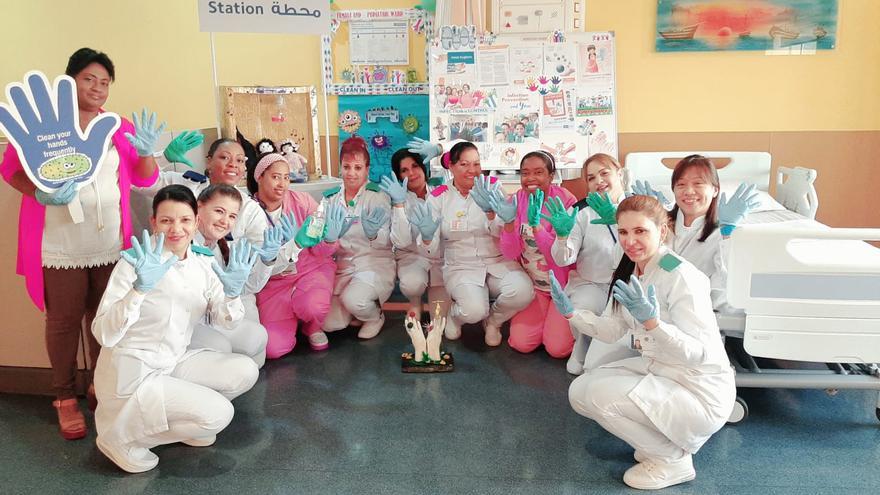
![]() 14ymedio, Havana, November 8 2019 — If the Más Médicos program in Brazil was a gold mine for the Cuban government, its equivalent in Qatar is the crown jewel. For each contracted physician, the small oil emirate pays between 5,000 and 10,000 dollars to Havana, according to information published this Friday by The Guardian.
14ymedio, Havana, November 8 2019 — If the Más Médicos program in Brazil was a gold mine for the Cuban government, its equivalent in Qatar is the crown jewel. For each contracted physician, the small oil emirate pays between 5,000 and 10,000 dollars to Havana, according to information published this Friday by The Guardian.
The British newspaper dedicates an extensive article about the “Cuban hospital” inaugurated in 2012 in the periphery of the capital, Doha, and belonging to Qatar’s government, but whose staff is exclusively Cuban personnel, a total of 475 doctors, nurses and technicians.
According to the newspaper, each doctor is receiving about $1,000 a month, about 10% of what other foreign medical professionals can earn in Qatari state hospitals. The rest, between $4,000 and $9,000, remains in the hands of the Cuban state.
The agreements signed with Brazil during Dilma Rousseff’s term of office amounted to around $3,000 for the Cuban government coffers and $1,000 for the medical doctors. According to The Guardian, in the last decade Cuba has begun to look for partners in the Persian Gulf countries that have large economies in order to secure one of the most important sources of income other than with remittances; the so-called international missions from which the government obtains close to 8 billion dollars annually.
“I think we should help everyone,” says a Cuban doctor in Doha interviewed by the newspaper. “Based on that, yes, it’s fair, because I know that the remaining amount is used to support our Health and Education system … but if you think only of yourself, of course it’s not fair,” he said.
In response, one of the doctors who could freely express himself for having left the mission said he felt “like a slave” when he discovered that other doctors in that country were paid more than he was. “We were doing the same thing and earning a lot less than they did,” he says.
“Life in our country is very difficult and salaries are very bad,” said another of the doctors at the hospital. “Here we earn money for [Cuba] and also for us … One part for the country and another for each person,” he explained.
Another of his colleagues added, following the official discourse: “Education in Cuba is free. The government educates us for many years and, therefore, it must take some of this.”
The salary conditions that they would have in Cuba make the salary and labor exploitation in international missions even attractive for some of them. “I earn around 1,100 dollars. It’s not the best, but it’s not bad either,” explains one of the doctors.
The doctors confirmed that they are allowed visits from their families, but that family members are not allowed to stay, in the usual government line to deter possible escapes. The “deserters” are punished with a ban on returning to Cuba for at least eight years, unless they consent to join the National Health System.
Annarella O’Mahony, a Cuban resident in Ireland and editor of the website Nosomosdesertores, somoscubanoslibres, (We are not deserters, we are free Cubans) told The Guardian that this use of family ties to prevent doctors from leaving the mission “is cruel, inhumane, unconstitutional and contrary to international law.”
The doctor who left the Qatari mission told the British newspaper that she took advantage of the Cuban Medical Professional Parole, a U.S. program through which she was able to travel to the United States, but which was later ended by the Obama Administration. “I tell my mother when I’m on the phone that, despite all the difficulties and the pain, I would do it again. I will never go back to Cuba. There is no future there.”
In addition to the Cuban doctors, Qatar welcomes North Korean workers who participate in similar agreements.
The Arab country, which has been questioned by international bodies on labor rights, recently announced reforms to its legislation and will for the first time allow workers to change occupations without permission from their employer, although it is almost certain that the measure will not affect Cuban doctors.
Translated by: Rafael Osorio
______________________________
The 14ymedio team is committed to practicing serious journalism that reflects Cuba’s reality in all its depth. You can help crowdfund a current project to develop an in depth multimedia report on dengue fever in Cuba; the goal is modest, only $2,000. Even small donations by a lot of people will add up fast. Thank you!
